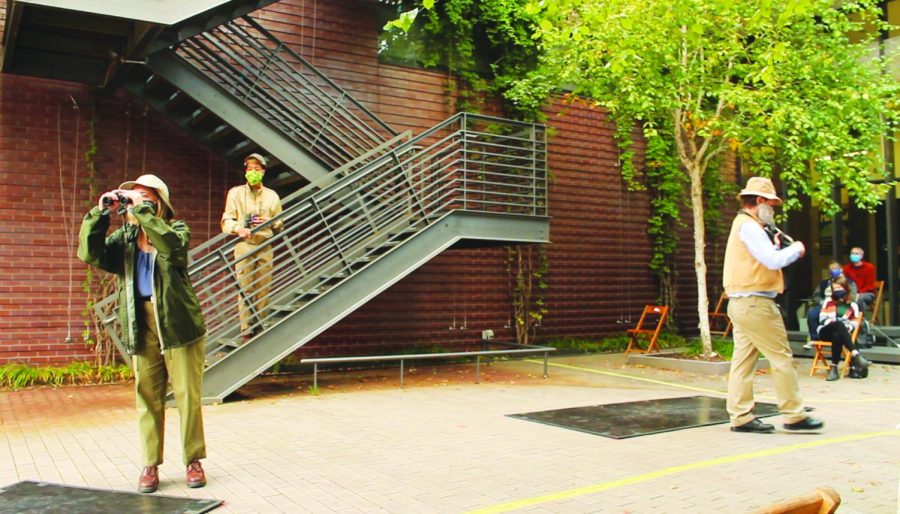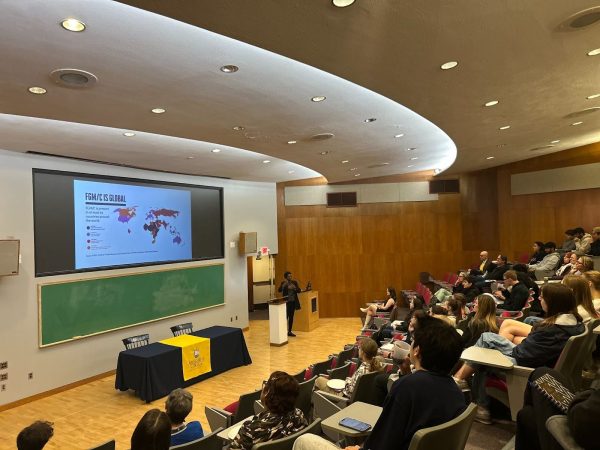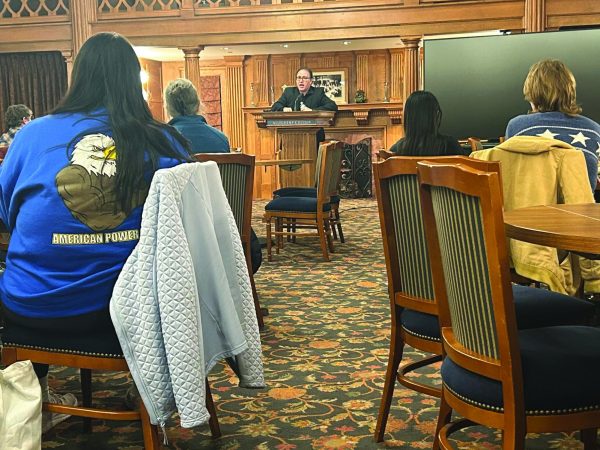Playshop Theatre returns with ‘Go Play Outside!’
Draigh Ricketson, Avantae Gonzalez, and Isabella James perform in “Habitat” by Professor of English Ben Slote.
For the last two weekends, the courtyard of the Vukovich Center for Communication Arts has echoed with the sounds of the Playshop Theatre’s “Go Play Outside!,” a series of socially distanced short plays and dance productions.
The 11 performances varied from comic, like “Sure Thing” to serious, as seen in “Chiaroscuro.” They discussed societal issues from domestic abuse, explored in “Poof!”, to homophobia and sexual assault, examined in “Habitat” by Professor of English Ben Slote.
The acts were divided into three shows, each running 50-60 minutes and running on a rotating schedule between the three showtimes. One such show focused almost exclusively on the climate, featuring plays like “Pond Life,” a conversation between two frogs in a polluted swamp, and “The Rubik’s Cube Solution,” which comments on the complexity — or simplicity — of lowering human carbon dioxide emissions.
Due to concerns about the spread of COVID-19, the theatre’s standard fall season — which included a production of “Sweat,” the winner of the 2017 Pulitzer Prize for Drama — was canceled. “Go Play Outside!” was born of the Playshop’s efforts to put on a show despite the pandemic.
“Over the summer we were talking about, ‘how could we possibly do theater?’” said Michael Mehler, professor and chair of the communication, film and theatre department. “We started investigating ways in which we might be able to spread the audience out in the theater … Still, most of the recommendations, especially at that point, were not to do anything inside. For anyone who paid attention to what was happening in live theater and live performances in general, everybody just shut down.”
Moving the performance out to the Vukovich courtyard shifted the format from a traditional “proscenium” to a “thrust” arrangement. A “proscenium” arrangement is the traditional auditorium — the audience faces the stage head-on. But in a “thrust” arrangement, the audience surrounds the stage on three sides, adding complexity to the performance.
“When we’re down there, and we’re performing in front of these people, we’re face-to-face,” said Isabella James, ’24, who performed in “Habitat.” “In the auditorium, the lights would be blinding you, you wouldn’t really be able to see, so in that moment you’re in the moment on stage, but here you get to be in the moment while also connecting with the audience because you can actually see them and see their reactions.”
Emily Tekelenburg, ’24, attended some of the performances. She appreciated the deeper connection between the audience and the actors that the format enabled.
“You do feel like you’re being interacted with a bit more with the actors in this environment compared to one where you’re spaced apart and watching them on the stage,” Tekelenburg said.
All of the performers wore masks and were socially distanced, which altered the way they approached the show.
“(Acting) is very, I wouldn’t say physical, but you do form connections with your castmates as well as the people in the scenes with you,” James said. “I know in “Habitat,” for example, there was a stage direction (where) two of the characters were supposed to embrace, which obviously we couldn’t do. It was definitely difficult forming those connections within the scenes, but it was also kind of cool to find those connections in ways where we could be physically distanced and still convey that same information to the audience.”
Mehler noted that the dynamics of the space dictated a different approach to acting.
“Thinking about gesture, posture, taking things in, releasing them, making the body work much broader, because it is more challenging to hear a performer,” Mehler said. “We’ve basically got about a 40-by-60 foot box here, and not the world’s best acoustics. They’re not bad, but they’re hard with a mask.”
All of the plays were held outside, a first for both James and Brittany Joseph, ’21, who stage-managed three of the performances.
“Our actors and our stage managers, like myself, have never really had to think about movement in a space like this and (have never) thought about voice in a space like this,” Joseph said. “I think that’s been the biggest change for us, working in a space where you have, in some ways, a lot less limitations than in a place like our theater in Vukovich.”
Mehler saw performing outside as a benefit for his students as it gave them experience for working on shows beyond the Playshop itself.
“I think it’s a great opportunity for students to know what outdoor performance is like,” Mehler said. “Some of their first jobs are probably going to be in outdoor theaters … and, in all honesty, pessimistically, this is not the last pandemic we’re going to face in our lifetimes.”
As the weather grows colder, however, outdoor shows like “Go Play Outside!” will be much harder to produce, while indoor shows are still too risky to host. Thus, many groups — like the Student Experimental Theater — are shifting their performances online
“I know (SET is) planning some Zoom performances,” Mehler said. “They’re going to distribute opportunities for lots of students to be involved, but they’re going to do those things on Zoom. I think people who, again, pay attention to live theater have seen various forms of video-recorded and/or live video performance, and so I think that’s what’s going to happen during the colder months.”
But for Tekelenburg, Zoom performances wouldn’t be the same as an in-person experience.
“People truly need to be there in order to get the true experience from a play and to gain that perspective that both the actors and the writers are trying to demonstrate to them,” Tekelenburg said. “That separation with the camera between the audience and the actors, the writers, or even the musicians is something that has to be (dealt) with.”
Mehler hopes that, even after restrictions are lifted, he hopes to return to the Vuk’s courtyard for similar events.
“I want to come back to this next fall even if we’re all allowed to hang out without masks on and we can cram in 75 people as opposed to 25 people,” Mehler said. “I still think this is a wonderful opportunity … (Grounds for Change) came. We partnered with them to come serve hot drinks to get people out and about. I think it’s good for everyone’s social well-being.”
The final four performances of “Go Play Outside” are this weekend, Oct. 10 and 11 at 1 p.m. and 4 p.m. Reservations can be made online by visiting the Playshop’s website.

Sami Mirza is a senior from many different places. He is majoring in International Studies with a focus on the Middle East and North Africa and minor in...








